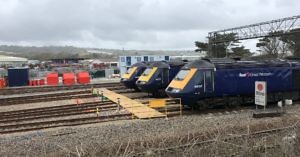At ESMO IO last Fall, Genentech/Roche were first past the post in 1L non-small cell lung cancer (NSCLC) with data from their phase 3 study in non-squamous patients evaluating the combination of chemotherapy and bevacizumab plus atezolizumab versus chemotherapy alone.

The 1L NSCLC race continues apace…
Since then, there has been much anticipatory excitement for BMS and Merck’s phase 3 trials, CheckMate-227 and KEYNOTE189, respectively. These data will be now presented at the annual meeting of AACR in Chicago next month.
In the meantime, there are also the overall survival data expected soon from AstraZeneca’s MYSTIC trial – will it be positive despite a PFS miss?
Later this year, the company have another study (NEPTUNE) result expected that explores the combination of durvalumab plus tremelimumab versus platinum-based standard chemotherapy in first line treatment of patients with epidermal growth factor receptor (EGFR) and anaplastic lymphoma kinase (ALK) wild-type advanced or metastatic NSCLC. This has been a controversial area for IO studies to date and the story here may well be more subtle and complex than many realise.
Next year we can also expect to see more readouts from Pfizer/EMD Serono’s JAVELIN LUNG 100 (avelumab) in both squamous and non-squamous histologies, while AstraZeneca’s POSEIDON study is in squamous patients only.
Just this week, Genentech again announced their phase 3 squamous NSCLC trial readout with positive PFS in favour of the combination of chemotherapy plus atezolizumab versus chemotherapy alone. The BMS CheckMate-227 study included both sets of histologies and no details were provided in the announcement, so hopefully this data will be available at AACR.
In Pharmaland we hear much noise around First-in-Class and Best-in-Class claims but, ultimately, it will all come down to data. In oncology, it always does.
In our latest review post, we take a look at both squamous and non-squamous settings and what we learn from the latest available information. Surprisingly, it’s quite a lot and there are important nuances to consider as well…
To learn more from thought leaders and get a heads up on our latest oncology insights, subscribers can log-in or you can click to gain access to BSB Premium Content.
This content is restricted to subscribers
 ESMO IO always seems a good place for finding tricky immunotherapy datasets and this year was no different with Mirati revealing their update adagrasib plus pembrolizumab data from the KRYSTAL 1 and 7 trials.
ESMO IO always seems a good place for finding tricky immunotherapy datasets and this year was no different with Mirati revealing their update adagrasib plus pembrolizumab data from the KRYSTAL 1 and 7 trials.

 Chicago June 3, 2018: The data for the phase 3 KEYNOTE–042 trial has just been presented in the plenary session of the 2018 annual meeting of the American Society for Clinical Oncology (#ASCO18).
Chicago June 3, 2018: The data for the phase 3 KEYNOTE–042 trial has just been presented in the plenary session of the 2018 annual meeting of the American Society for Clinical Oncology (#ASCO18).

 After yesterday’s notes on the exciting lung cancer clinical trials plenary, I received a bunch of questions from readers following yesterday’s analysis of the 1L NSCLC market.
After yesterday’s notes on the exciting lung cancer clinical trials plenary, I received a bunch of questions from readers following yesterday’s analysis of the 1L NSCLC market.

 It was therefore no surprise to hear Merck’s
It was therefore no surprise to hear Merck’s